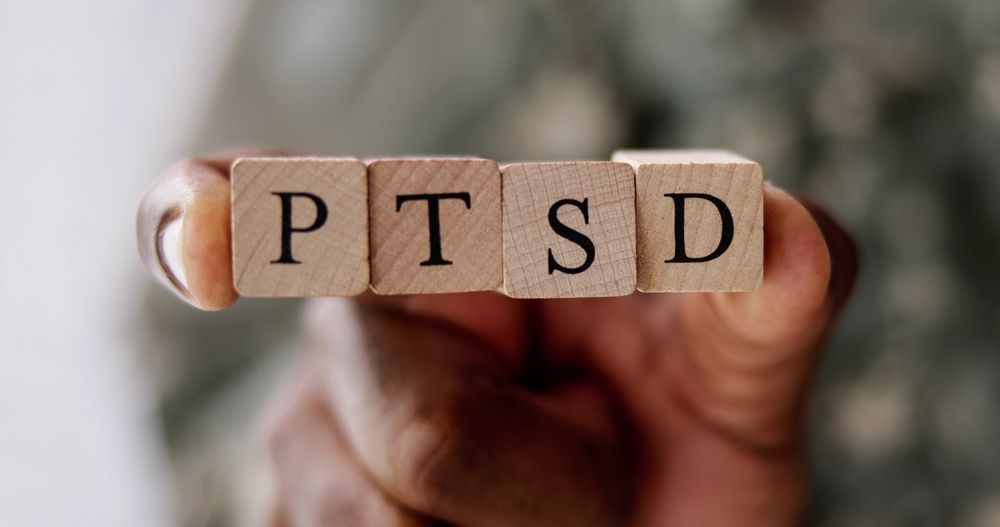Last Updated:
May 27th, 2025
PTSD and Addiction | Symptoms and Support Options
What is PTSD?
Post-Traumatic Stress Disorder (PTSD) is a mental health condition that can develop after experiencing or witnessing a traumatic event. Trauma can take many forms, including accidents, violence, abuse, natural disasters or military combat. While many people process traumatic experiences over time, PTSD occurs when the mind and body struggle to move past the event, leading to ongoing distress.

Are there different types of PTSD?
PTSD can manifest in different ways depending on the nature of the trauma, the individual’s response to it and how the symptoms develop over time. While all forms of PTSD share common symptoms, there are key differences in how these symptoms present.
Below are the main types of PTSD (Note: these are the most common types, and more types of PTSD exist):
Acute PTSD
Acute PTSD is the most commonly recognised form of the disorder. It occurs when symptoms develop within three months of a traumatic event and last for at least a month.
Symptoms:
- Recurrent distressing memories or flashbacks
- Nightmares related to the trauma
- Heightened anxiety or irritability
- Avoidance of trauma-related reminders
- Difficulty concentrating or sleeping
This form of PTSD often improves with therapy and support. However, if left untreated, it can develop into chronic PTSD, where symptoms persist for longer periods.
Complex PTSD (cPTSD)
Complex PTSD (cPTSD) develops from prolonged or repeated trauma rather than a single traumatic event. It is often seen in survivors of childhood abuse, domestic violence, war or long-term neglect.
Symptoms:
- All symptoms of PTSD but with additional emotional and interpersonal struggles
- Persistent feelings of shame, guilt or worthlessness
- Difficulty trusting others or forming healthy relationships
- Emotional dysregulation (struggling to control emotions)
- Episodes of dissociation (feeling detached from oneself or reality)
cPTSD is often misdiagnosed as other mental health conditions, such as borderline personality disorder (BPD), due to its impact on emotions and relationships. Treatment involves trauma-focused therapy and long-term psychological support.
Delayed-onset PTSD
While most PTSD symptoms appear within a few months of trauma, delayed-onset PTSD occurs when symptoms develop six months or more after the event. Some people may function normally at first but later experience a trigger (such as a life change or reminder of the trauma) that causes symptoms to surface.
Symptoms:
- Sudden onset of PTSD symptoms long after the trauma
- Emotional distress that seems to come out of nowhere
- Avoidance of reminders that weren’t previously distressing
- Difficulty understanding why symptoms are appearing so much later
Because the symptoms emerge much later, people with delayed-onset PTSD may not initially associate their struggles with past trauma, making diagnosis and treatment more challenging.
PTSD and addictions
Experiencing trauma can leave a lasting impact and for many people, it changes how they cope with stress. Studies show that around 70% of people go through at least one traumatic event each year, with a significant number developing post-traumatic stress disorder (PTSD) or experiencing distressing symptoms linked to trauma.
One common way people try to manage these overwhelming emotions is through substance use or habitual behaviours. In this section, we focus on the different types of addictions commonly correlated with PTSD.
The link between PTSD and SUD
For some, drinking or using drugs may feel like a way to escape intrusive memories, anxiety or emotional numbness. But while substances might offer temporary relief, they often create more problems in the long run, leading to dependence or addiction.
On the other hand, people who already use substances may be at a higher risk of experiencing traumatic events, whether through dangerous situations, impaired decision-making or re-traumatisation.
This creates a cycle where trauma fuels addiction and addiction, in turn, increases the chances of further trauma.
A recent study found that substances like:
- Tobacco
- Alcohol
- Cannabis

are highly comorbid with PTSD, meaning they are often used by individuals experiencing post-traumatic stress. However, other substances, including heroin, have also been linked to PTSD, particularly in cases where individuals seek stronger forms of escape from distressing memories and emotions.
The link between behavioural addictions and PTSD
When we think about addiction, substances like alcohol or drugs often come to mind. However, behavioural addictions are also closely tied to trauma.
Internet addiction and PTSD
Research has found that both PTSD and Complex PTSD (cPTSD) are strongly associated with behavioural addictions, particularly excessive internet use, with a stronger link observed in individuals with cPTSD. This suggests that when treating behavioural addictions, it’s crucial to assess for underlying trauma and stress-related conditions.
Gambling addiction and PTSD
For conditions like gambling disorder (GD), the connection to PTSD runs even deeper. Studies show that while traumatic experiences in childhood and adulthood can contribute to GD, PTSD severity plays a bigger role in how severe gambling addiction becomes. Many individuals with PTSD turn to gambling as a way to escape distressing emotions or dissociate from painful memories. However, this cycle can actually make both PTSD and gambling addiction worse over time.
Internet gaming disorder and PTSD
For many, video games offer a way to escape stress and disconnect from overwhelming emotions. This is especially true for individuals who have experienced trauma, as avoiding stressful or traumatic reminders can feel necessary for coping. Research suggests that post-traumatic stress symptoms (PTSS) are linked to excessive internet use, and while Internet Gaming Disorder (IGD) is still being studied in this context, the connection is becoming clearer.
People struggling with PTSD may turn to gaming as a form of dissociation—blocking out distressing thoughts and emotions. However, this pattern can reinforce avoidance, making it harder to process trauma in the long run. The more gaming becomes a way to escape, the more it can interfere with daily responsibilities, relationships and emotional well-being.
Treating PTSD and addiction in rehab
Recovering from addiction while living with PTSD can be challenging. Trauma affects how you process emotions and cope with stress, making addiction treatment feel overwhelming. That’s why inpatient rehab for dual diagnosis focuses on stabilising PTSD symptoms while also addressing addiction, ensuring you’re in the best position to recover.
If you have a substance addiction, detox is often the first step. This process helps your body safely withdraw from drugs or alcohol, reducing physical dependence so you can fully engage in therapy. Without detox, withdrawal symptoms can make PTSD symptoms worse, increasing the risk of relapse.
Once detox is complete, therapy helps address both addiction and PTSD symptoms by teaching healthier coping mechanisms and breaking the cycle of self-medication.
Key therapies include:
- Cognitive behavioural therapy (CBT): Helps you identify negative thought patterns and develop healthier ways to respond to triggers.
- Dialectical behaviour therapy (DBT): Teaches skills to manage stress, regulate emotions and build healthier relationships.
- Group therapy: Provides a support network where you can share experiences, reduce isolation and gain valuable insights.
- Holistic therapies: Activities such as yoga, meditation and art therapy help improve emotional well-being and reduce stress.
By treating both PTSD and addiction together, inpatient rehab helps you regain control and work towards lasting recovery.
The next steps
If you’re struggling with addiction and PTSD, help is available. At Addiction Helper, we can guide you towards specialist treatment options that address both conditions, ensuring you get the support you need. Don’t face this alone; reach out today for confidential advice and take the first step towards lasting recovery. Call now or chat with us online.
Our compassionate team are ready and available to take your call, and guide you towards lasting the lasting addiction recovery you deserve.
Frequently Asked Questions
(Click here to see works cited)
- Garrison-Desany HM, et al. Post-traumatic stress and future substance use outcomes: leveraging antecedent factors to stratify risk. Front Psychiatry. 2024 Mar 8;15:1249382. doi: 10.3389/fpsyt.2024.1249382. PMID: 38525258; PMCID: PMC10957776.
- Rodolfo Rossi a, et al. “The Association between Traumatic Experiences and Substance and Behavioral Addictions in Late Adolescence: A Role for PTSD and CPTSD as Potential Mediators.” Journal of Psychiatric Research, Pergamon, 21 Oct. 2023, www.sciencedirect.com/science/article/pii/S0022395623004612.
- H. Moore III, et al. “Gambling Disorder and COMORBID PTSD: A Systematic Review of Empirical Research.” Addictive Behaviors, Pergamon, 14 Oct. 2020, www.sciencedirect.com/science/article/abs/pii/S0306460320308431.
- Guangzhe Frank Yuan a, et al. “Gaming to Cope: Applying Network Analysis to Understand the Relationship between Posttraumatic Stress Symptoms and Internet Gaming Disorder Symptoms among Disaster-Exposed Chinese Young Adults.” Addictive Behaviors, Pergamon, 24 Aug. 2021, www.sciencedirect.com/science/article/abs/pii/S0306460321002811.

